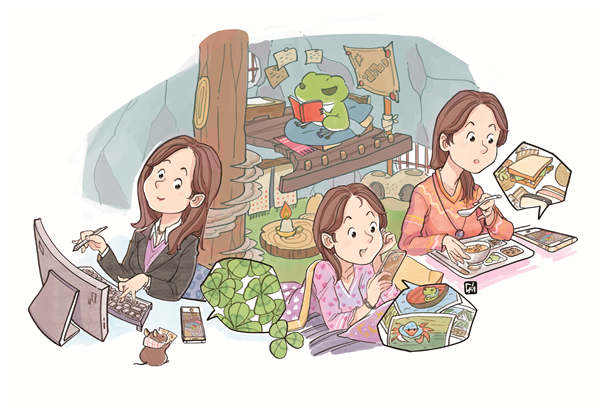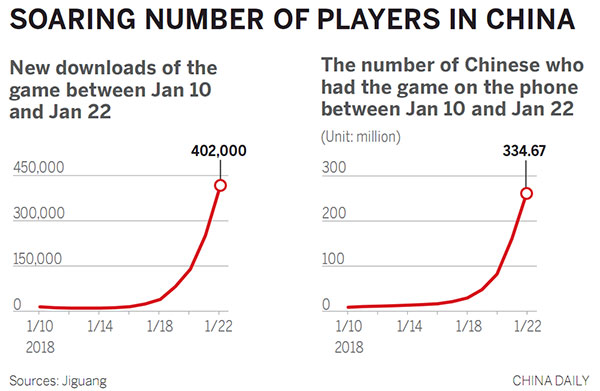 |
|
CAI MENG/CHINA DAILY |
A mobile game about an amphibian's wanderlust has become wildly popular among young Chinese. Xu Lin reports.
Zhou Xiaoli stares into her phone's screen and gently tells the frog it's bedtime.
"How long have you been reading this book?" she asks the amphibian.
"It's time to sleep."
Soon, Zhou's mother enters the room.
Mom, in turn, tells the girl "it's time to sleep".
The frog is a digital character from the Japanese mobile game Tabi Kaeru, or Travel Frog.
The game has been extremely popular among young Chinese, drawing comparisons to the sensational Pokemon Go and Tamagotchi phenomena of previous years.
"It's so much fun that I rush to put my frog to bed when my mom does the same to me," says the 28-year-old, who works in a foreign company in Beijing.
"It makes me feel like a mother, myself."
The game was released by Hit-Point Co Ltd, which also produced Neko Atsume:
Kitty Collector, a mobile game that became popular in China and the West in 2015.
Nearly 3.35 million Chinese had Travel Frog on their phones between Jan 10 and Jan 22, data company Jiguang.cn reports. It was downloaded 402,000 times in China on Jan 22 alone.
The frog is anthropomorphized.
He carries luggage as he tours Japan and snaps photos of scenic spots such as hot springs and brings back local delicacies like strawberries and milk.
Players collect clovers that serve as currency to buy food, camping supplies and magical amulets for the frog. They can wait for new clovers to grow or purchase them for between 6 yuan and 25 yuan (95 US cents and $3.95).
Zhou spent 50 yuan to purchase all the gear. So, her frog can experience more adventures, such as boating in a bowl. Zhou doesn't typically play games but fell for Travel Frog instantly.
The frog sometimes hangs out at home, reading, eating or making wooden handicrafts. Players never know when he'll set out again.
He may travel for a few hours or for up to four days. Gamers can only wait and pack his luggage. The only clues they have about his trips are the photos he sends from the road.
 |
"The uncertainty (about what the frog will do) interests me," Zhou says.
"Even if in the same trip about one particular site, the photos are slightly different. For instance, sometimes, he's facing the camera. Sometimes, the shot is of the back of his head."
Zhou-like many players-worries about the frog when he travels for long periods of time. She often checks to see if he has returned or at least sent photos.
Her frog recently made a friend, to her delight. Two recent photos show the amphibian staring at a giant tree with a mouse.
"He's a cool frog," she explains.
"You can't control him. He has his own ideas and does whatever he likes. You can only pack his bags and observe him from afar. When I have a child, I'll treat him like this. I'll respect him as an individual and encourage him to make his own decisions.
"The frog is just like me. Playing the game is like viewing a reflection of part of myself."
Zhou enjoys traveling and often takes trips on her own.
She also decides to hit the road spontaneously. And she often buys postcards and local specialties.
Zhou felt a connection with the frog when she purchased postcards and snacks while visiting Fujian province's Xiamen recently.
She plans to visit the same Japanese destinations as her frog and take similar photos.
Players often share experiences.
"I want to know where the frog has been and what kind of photos he has sent back," 32-year-old Xiao Lixin says.
"I'll discuss it with friends. I've become that kind of so-called annoying mother, comparing my frog with others'. I worry when he travels. But when he's home, I wonder why he doesn't go out to have fun."
Players often see themselves in their frogs, she points out. For instance, hers likes delicious food.
Pan Jing, who studied in Japan for a year and now lives in Beijing, says: "It reflects the Japanese philosophy of living your own life and not bothering others. The frog isn't at all fussy. He can travel with whatever you pack and enjoy the pretty views along the way."
The 30-year-old, who has a 4-year-old daughter, points out many players don't have kids.
"They say it's like having a child," she says.
"A child younger than 5 wants to be with their parents constantly. The frog is more like an adolescent. He's rarely home and doesn't like to talk with his parents. So, you can only pack luggage."
Travel Frog appeals to people who rarely play games, Sina Games' former chief editor Zhou Wei says.
Those who've played Neko Atsume: Kitty Collector will be interested in the company's new game, he says.
Travel Frog is currently only available in Japanese. So, some Chinese players have been voluntarily translating it into Chinese. They also share tips online, such as how to get photos of the frog with other animals, Zhou Wei says.
These translations and social-media interactions are crucial to the game's success, he believes. Some netizens download it after seeing such memes as cartoons and chat stickers with the frog as their motif.
"Most players are female … and they even call the frog 'son'. It's like raising a pet," he says.
"Unlike earlier popular mobile games, such as King of Glory (a multiplayer online battle game), Travel Frog doesn't require much time. It's a new experience for gamers. But the novelty may soon fade. The kitty's popularity only lasted about a month."
The Beijing News recently reported the rumor that Hit-Point Co Ltd developed the game to test whether people were willing to have children in the future.
Mayuko Uemura from the company told the newspaper the game targets females as young as 10 up to those in their 20s.
In the game, the frog leads a free and relaxing life-it often travels spontaneously-which is probably one of reasons for its popularity among the young people who are busy and stressed, according to Uemura.
"It's relaxing since it's not competitive," says Deng Xiquan, head of the Youth Research Institute of the China Youth and Children Research Center.
"Players feel empathy. Most are undergoing life transitions and can learn about parenthood. It may also remind them of their childhoods.
"You know the frog will return. But you don't know when. That creates a kind of happiness."

Presented by Chinadaily.com.cn Registration Number: 10023870-7
Copyright © Ministry of Culture, P.R.China. All rights reserved